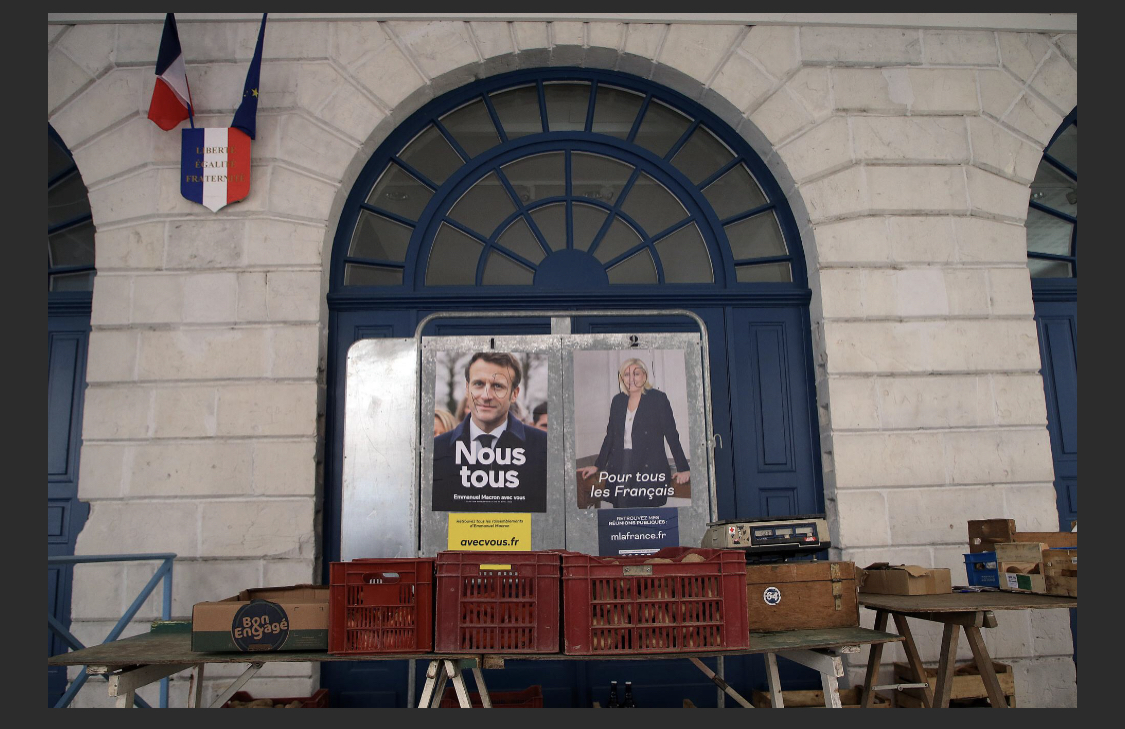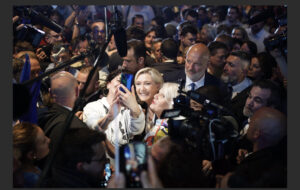French Election: Macron in Pole Position ,Le Pen racing hard

French President Emmanuel Macron is in the pole position to win reelection Sunday in the country’s presidential runoff, yet his lead over far–right rival Marine Le Pen depends on one major uncertainty: voters who could decide to stay home.
A Macron victory in this vote — which could have far–reaching repercussions for Europe’s future direction and Western efforts to stop the war in Ukraine — would make him the first French president in 20 years to win a second term.

All opinion polls in recent days converge toward a win for the 44–year–old pro–European centrist — yet the margin over his nationalist rival varies broadly, from 6 to 15 percentage points, depending on the poll. Polls also forecast a possibly record–high number of people who will either cast a blank vote or not vote at all.
Overseas French territories allowed voters to start casting ballots Saturday in polling stations that ranged from near the Caribbean shore in the Antilles to the savannahs of French Guiana on the South American coast.
Back on the French mainland, workers assembled a stage Saturday beneath the Eiffel Tower where Macron is expected to make his post–election speech, win or lose.
France’s April 10 first–round vote eliminated 10 other presidential candidates, and who becomes the country’s next leader — Macron or Le Pen — will largely depend on what supporters of those losing candidates do on Sunday.
The question is a hard one, especially for leftist voters who dislike Macron but don’t want to see Le Pen in power either. Macron issued multiple appeals to leftist voters in recent days in hopes of securing their support.
“Think about what British citizens were saying a few hours before Brexit or (people) in the United States before Trump’s election happened: ‘I’m not going, what’s the point?’ I can tell you that they regretted it the next day,” Macron warned this week on France 5 television.
“So if you want to avoid the unthinkable … choose for yourself!” he urged hesitant French voters.
The two rivals were combative in the final days before Sunday’s election, clashing Wednesday in a one–on–one televised debate. No campaigning is allowed through the weekend, and polling is banned.

Macron argued that the loan Le Pen’s far–right party received in 2014 from a Czech–Russian bank made her unsuitable to deal with Moscow amid its invasion of Ukraine. He also said her plans to ban Muslim women in France from wearing headscarves in public would trigger “civil war” in the country that has the largest Muslim population in Western Europe.
“When someone explains to you that Islam equals Islamism equals terrorism equals a problem, that is clearly called the far–right,” Macron declared Friday on France Inter radio.
In his victory speech in 2017, Macron had promised to “do everything” during his five–year term so that the French “have no longer any reason to vote for the extremes.”
Five years later, that challenge has not been met. Le Pen has consolidated her place on France’s political scene after rebranding herself as less extreme.
Le Pen’s campaign this time has sought to appeal to voters struggling with surging food and energy prices amid the fallout of Russia’s war in Ukraine. The 53–year–old candidate said bringing down the cost of living would be a top priority if she was elected as France’s first woman president.
She criticized Macron’s “calamitous” presidency in her last rally in the northern town of Arras.
“I’m not even mentioning immigration or security for which, I believe, every French person can only note the failure of the Macron’s policies … his economic record is also catastrophic,” she declared.
Political analyst Marc Lazar, head of the History Center at Sciences Po, said even if Macron is reelected, “there is a big problem,” he added. “A great number of the people who are going to vote for Macron, they are not voting for this program, but because they reject Marine Le Pen.”
He said that means Macron will face a “big level of mistrust” in the country.
Macron has vowed to change the French economy to make it more independent while still protecting social benefits. He said he will also keep pushing for a more powerful Europe.
His first term was rocked by the yellow vest protests against social injustice, the COVID–19 pandemic and the war in Ukraine. It notably forced Macron to delay a key pension reform, which he said he would relaunch soon after reelection, to gradually raise France’s minimum retirement age from 62 to 65. He says that’s the only way to keep benefits flowing to retirees.
The French presidential election is also being closely watched abroad.
In several European newspapers on Thursday, the center–left leaders of Germany, Spain and Portugal urged French voters to choose him over his nationalist rival. They raised a warning about “populists and the extreme right” who hold Putin “as an ideological and political model, replicating his chauvinist ideas.”
A Le Pen victory would be a “traumatic moment, not only for France, but for European Union and for international relationships, especially with the USA,” Lazar said, noting that Le Pen “wants a distant relationship between France and the USA.”
In any case, Sunday’s winner will soon face another obstacle in governing France: A legislative election in June will decide who controls a majority of seats in France’s National Assembly.
Already, the battles promise to be hard–fought.
AP

